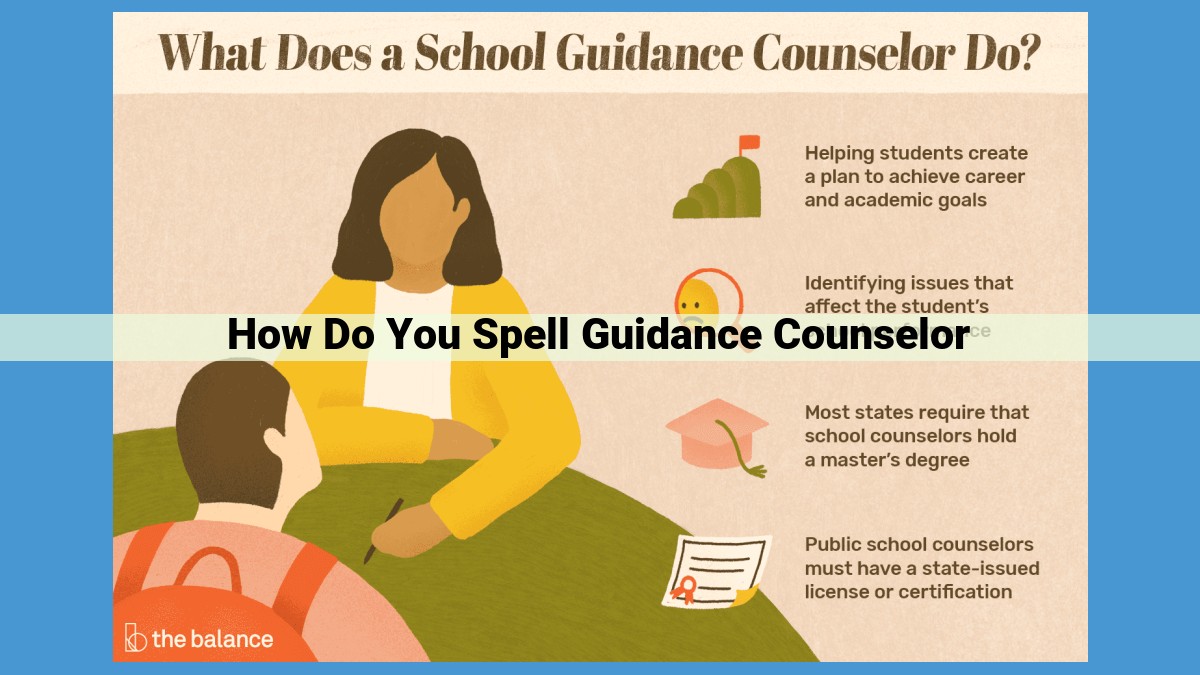Guide the spelling of “guidance counselor” by understanding its roots and following a step-by-step breakdown: “gui” (guide), “d” (direction), “ance” (quality), “coun” (advice), “selor” (provider). As school personnel, guidance counselors contribute to a team of professionals dedicated to supporting students’ emotional, academic, and career journeys, offering various forms of educational support.
Spelling Guidance Counselor: Breaking Down the Etymology and Orthography
The term guidance counselor is a compound word that encapsulates the multifaceted role these professionals play in the lives of students. Understanding the word’s origins can help us delve deeper into its significance.
Guidance stems from the Latin word guidare, meaning “to guide” or “to lead.” It connotes the counselor’s primary function: to provide direction and support to students as they navigate their academic, personal, and career journeys.
Counselor originates from the Old French word conseiller, derived from the Latin consulere, which translates to “to advise” or “to deliberate.” This emphasizes the counselor’s role as a trusted advisor who assists students in making informed decisions and developing coping mechanisms.
Spelling the term correctly is crucial for both written communication and professional context. Follow these step-by-step instructions to ensure accuracy:
- Start with the word guidance, which begins with the letter “g” followed by “u,” “i,” “d,” and “a.”
- Next, add counselor, which starts with the letter “c” followed by “o,” “u,” “n,” “s,” “e,” “l,” and “o.”
- Combine both words to form guidance counselor. Double check the spelling to ensure that all letters are in the correct order.
Remember, guidance counselor is always spelled with a “u” in both “guidance” and “counselor.”
Definition of a Guidance Counselor
A guidance counselor plays a pivotal role in guiding students through the complexities of academic, emotional, and career development. Serving as trusted mentors and advisors, they provide holistic support to help students reach their fullest potential.
Role and Responsibilities:
- Collaborate with students to identify their strengths and challenges
- Develop and implement individualized guidance plans to support students’ growth
- Provide emotional and academic counseling to address personal or learning difficulties
- Facilitate career exploration and help students prepare for their future aspirations
- Advocate for students’ rights and well-being, ensuring their voices are heard
Work Settings:
Guidance counselors are typically employed in educational institutions such as:
- Elementary schools: Support young students in developing social, emotional, and academic skills
- Middle schools: Guide students through transitions and provide support during adolescence
- High schools: Help students prepare for college, careers, and the future
- Colleges and universities: Provide guidance and support to students throughout their higher education journey
School Personnel: The Team Behind Our Students
School personnel are the individuals who work together to provide a supportive and educational environment for students. This team includes teachers, administrators, counselors, nurses, librarians, and other staff members. Each member of the school personnel team has a unique role to play in supporting students’ academic, social, and emotional development.
Guidance counselors are an important part of the school personnel team. They provide students with academic, career, and personal counseling. Guidance counselors help students navigate the challenges of adolescence and young adulthood. They also help students develop the skills they need to be successful in school and beyond.
The school personnel team is a collaborative one. All members of the team work together to ensure that students have the best possible educational experience. Guidance counselors play a vital role in this collaboration. They work with teachers, administrators, and other staff members to develop and implement programs and services that meet the needs of students.
For example, guidance counselors may work with teachers to develop lesson plans that include topics such as career exploration and study skills. They may also work with administrators to develop school policies that support students’ mental health and well-being.
Guidance counselors are an essential part of the school personnel team. They provide students with the support and guidance they need to succeed in school and beyond.
Educational Support: Empowering Students
Guidance Counselors: A Beacon of Support
In the tapestry of education, guidance counselors weave a vital thread, providing a safety net and a pillar of support for students as they navigate the complexities of school and life. They serve as champions for students’ well-being, empowering them to reach their full potential.
Diverse Educational Support
The educational landscape offers a kaleidoscope of support services tailored to students’ needs. From academic tutoring to extracurricular activities, from counseling to mentoring, these programs are designed to nurture students’ intellectual, emotional, and social growth. Guidance counselors play a pivotal role in connecting students with these resources, ensuring they have the tools they need to succeed.
Emotional Guidance: A Listening Ear
The school years can be a time of immense emotional upheaval for students. Guidance counselors provide a safe and confidential space where students can share their worries, fears, and aspirations. They offer empathy, support, and coping mechanisms to help students navigate the challenges of adolescence and young adulthood.
Academic Guidance: A Path to Success
Guidance counselors are experts in academic planning and goal-setting. They help students explore their interests, identify their strengths and weaknesses, and develop a roadmap for their educational journey. They provide individualized guidance on course selection, study skills, and test preparation, empowering students to excel in their studies.
Career Guidance: Paving the Future
As students approach graduation, the pressure to choose a career path can be overwhelming. Guidance counselors serve as career counselors, helping students identify their passions, explore different professions, and develop a plan for their future. They provide information on higher education, internships, and job opportunities, empowering students to make informed decisions about their careers.
Guidance counselors are essential members of the school team, providing comprehensive support to students as they navigate the challenges and opportunities of their educational journey. Their dedication, empathy, and expertise empower students to thrive academically, emotionally, and personally, ultimately shaping them into confident, successful, and contributing members of society.
